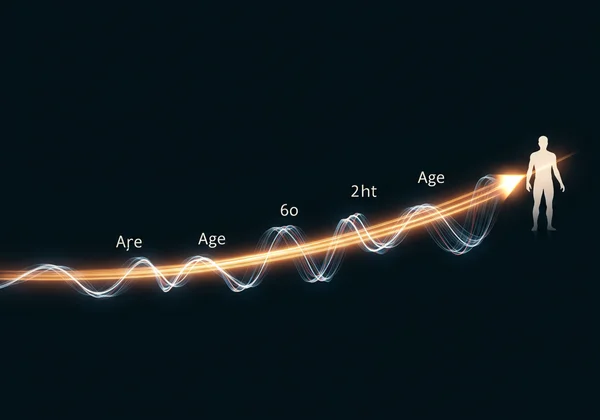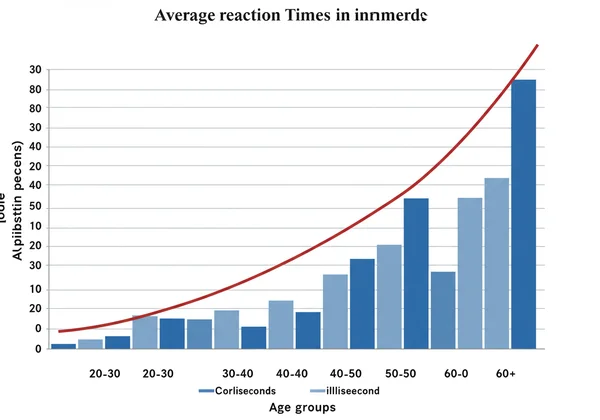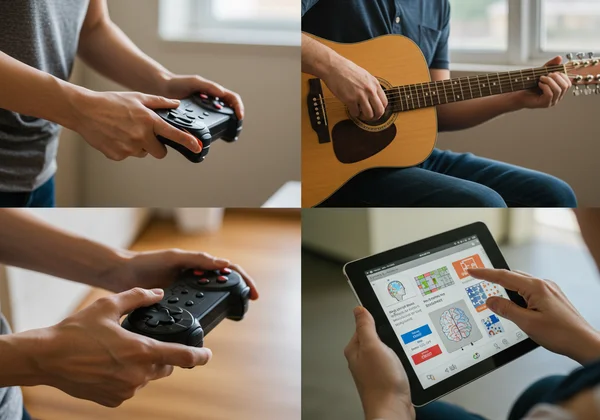Age & Reaction Time: Understanding Changes & Your Speed
August 4, 2025 | By Marcus Adler
Have you ever felt a step slower than you used to be, whether reaching for a falling glass or reacting in traffic? It's a feeling many people experience as they age. This change is directly linked to our reaction time, a fundamental measure of our nervous system's efficiency. But how exactly does reaction time evolve with age, and more importantly, is there anything we can do about it? If you've ever asked yourself, What is a good reaction time for my age?, this guide is for you. We will explore the science behind these shifts, provide benchmarks for comparison, and share practical ways to keep your reflexes sharp. The first step to understanding your personal speed is to measure it, which you can do with a simple reaction time test.

The Science Behind Age-Related Reaction Time Changes
Our reaction time isn't just about how fast our hands move; it's a complex process involving perception, processing, and response. As we age, natural changes in our brain and nervous system can influence this speed. Instead of fearing these changes, understanding them empowers us. The slight slowing of our aging reflexes is a well-documented phenomenon in cognitive psychology, but its trajectory is not set in stone.
What Happens to Your Brain as You Age?
As the years pass, the brain undergoes subtle but significant transformations. The volume of the cerebral cortex, particularly the prefrontal cortex responsible for complex thought and decision-making, may gradually decrease. Furthermore, the efficiency of neurotransmitters—the chemical messengers that transmit signals between brain cells—can change. These neurological changes are a normal part of life, much like getting gray hair. They don't necessarily signal a problem but rather a shift in the brain's operational dynamics. These changes are central to understanding lifelong brain health.
Neural Pathways & Processing Speed: The Key Components
Think of your brain's neural pathways as a vast network of highways. When you're young, these highways are freshly paved with a thick layer of myelin, a fatty substance that insulates nerve fibers and allows electrical signals to travel at incredible speeds. With age, this myelin sheath can thin out in some areas. This doesn't block the signals, but it can slow them down, much like a smooth highway developing a few bumps. This affects neural processing and is a primary reason why our cognitive speed might decrease, increasing the time it takes for a visual cue to travel from your eyes to your brain and then to your clicking finger. You can get a feel for your own processing speed when you try the click test.

Average Reaction Time by Age Group: Benchmarks & What to Expect
One of the most common questions is how our own speed compares to others. While every individual is unique, scientific studies have established general benchmarks for average reaction time by age. These averages provide a useful reference point, but remember they are not definitive measures of your cognitive health. They simply offer a snapshot of typical performance across different life stages.
Finding Your Benchmark: What's a Good Reaction Time for Your Age?
Reaction time is typically measured in milliseconds (ms) and tends to be fastest in our 20s, followed by a gradual and gentle decline. Here are some widely accepted average ranges for a simple visual reaction time test:
-
Ages 20-30: 190-220 ms
-
Ages 30-40: 210-240 ms
-
Ages 40-50: 220-260 ms
-
Ages 50-60: 230-280 ms
-
Ages 60+: 250-310 ms

These numbers represent the middle ground. Many factors can push your score to either end of the spectrum. Curious where you fall? You can measure your reflexes in just a few seconds and see how you compare to your age group's average.
Beyond the Numbers: Other Factors Influencing Your Speed
Age is just one piece of the puzzle. It's crucial to recognize other variables that strongly influence your reaction speed, often more than your chronological age. Lifestyle factors play a massive role in maintaining sharp cognitive function. Consistent, high-quality sleep is perhaps the most critical, as it's when the brain clears out toxins and consolidates memories. Similarly, a nutrient-rich diet, regular physical exercise, and hydration levels all directly impact your brain's ability to perform. Chronic stress, on the other hand, can significantly slow down your responses.
Practical Strategies to Keep Your Reflexes Sharp at Any Age
Neuroscience tells us our brains are remarkably adaptable, capable of change and improvement through neuroplasticity. This means you can actively work to preserve and even improve reaction time regardless of your age. Taking proactive steps can help mitigate the natural effects of cognitive decline and keep you feeling sharp and responsive.
Brain Training Exercises & Games for Cognitive Fitness
Engaging your brain with novel challenges is like taking it to the gym. Activities that require quick thinking and responses can help strengthen neural connections. This doesn't have to be a chore; it can be fun! Consider incorporating some of these into your routine:
-
Reaction Time Games: Purpose-built
reaction time gamesare excellent for targeted practice. Simple "click when it turns green" exercises, like the one on our homepage, are a direct way to train this skill. -
Video Games: Many video games, especially in the action and puzzle genres, demand rapid responses and can be a powerful form of
brain training. -
New Skills: Learning a musical instrument or a new language forces your brain to build new pathways and process information in different ways.

Lifestyle Adjustments for Optimal Brain Health
The foundations of a quick mind are built on a healthy lifestyle. Making small, consistent changes can have a profound impact on your cognitive performance. Key areas to focus on include:
- Aerobic Exercise: Activities like brisk walking, swimming, or cycling increase blood flow to the brain, delivering vital oxygen and nutrients.
- Mindful Diet: Focus on foods rich in antioxidants (berries, leafy greens) and omega-3 fatty acids (fatty fish, walnuts), which are known to support
brain health. - Prioritize Sleep: Aim for 7-9 hours of quality
sleepper night. This is non-negotiable for optimal reaction speed and overall cognitive function. - Stay Hydrated: Even mild dehydration can impair attention and slow down response times.
Sharpen Your Reflexes: Practical Steps for Cognitive Health
Understanding the science simplifies how reaction time changes with age and shows us how much influence we have. By incorporating brain-boosting activities and a healthy lifestyle, you can maintain your cognitive sharpness for years. Start by establishing your baseline: take our free tool today. Use it to track your progress as you apply these tips, taking an active role in your cognitive well-being.
Common Questions About Age and Reaction Speed
What is a good reaction time for my age?
A "good" reaction time is relative, but generally falls within the average range for your age group, as detailed above (e.g., 210-240 ms for someone in their 30s). However, being slightly slower or faster is normal. The best approach is to focus on your personal consistency and improvement rather than comparing obsessively. The easiest way to find out is to get your results with a quick test.
Is reaction time genetic?
Genetics does play a role in setting a baseline for your nervous system's efficiency. Some people are naturally predisposed to faster reflexes. However, research shows that lifestyle, training, and health factors have a significant impact, meaning your habits and actions can greatly influence your performance beyond your genetic starting point.
What causes slow reaction time as we age?
The primary causes are natural neurological changes, including the slowing of signal transmission along neural pathways (due to myelin changes) and shifts in neurotransmitter function. However, factors like lack of sleep, poor nutrition, dehydration, and a sedentary lifestyle can significantly exacerbate this slowing. It's often a combination of natural aging and modifiable lifestyle factors.
Can I really improve my reaction time at any age?
Absolutely. Thanks to the brain's neuroplasticity, you can improve your reaction time at any age. Consistent practice with tools like a reaction speed test, combined with regular exercise, a healthy diet, and adequate sleep, can strengthen neural connections and lead to measurable improvements in your response speed.